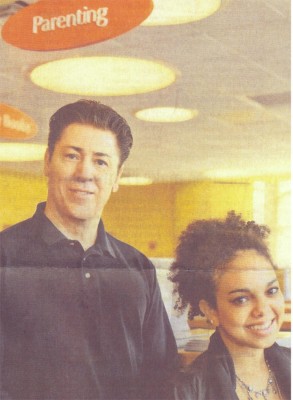
In a world of “tiger moms,” timid moms and “helicopter parents,” a Neag School alumnus offers a thoughtful and proven middle ground. Thomas McIntyre, who earned his Ph.D. in Special Education from the Neag School in 1981, dispenses advice to teachers and parents of youngsters with behavior challenges through his popular website, BehaviorAdvisor.com. The site offers a wide range of helpful materials for parents, teachers and others on topics related to positive and effective ways to help kids make better behavior choices.
McIntyre recently entered another realm, creating an iPhone/iPad/iTouch app titled “Positive Parenting Practices” (available at iTunes) in which he outlines what he calls “sound, research-based principles and practices that are translated into everyday language.” The app (and his BehaviorAdvisor.com) expands parents’ knowledge of behavior change principles and the repertoire of practices for guiding children and youth toward self-regulated appropriate actions.
“While many styles of parenting can create good kids,” McIntyre says, “we now know how to achieve our goals more quickly and completely. The most effective approach motivates children in positive and respectful ways, rather than fear of punishment. That latter style fails to promote inner control of one’s behavior or teach what to do in situations.”
McIntyre’s approach stresses that a positive outcome is accomplished by showing a child that certain choices are in his or her best interest, rather than simply exerting adult dominance. “Punitive strategies,” he says, “lose their impact as kids grow older. We want our youngsters to continue to view us as a trusted source of support. During times of disagreement, if that trust bond has been built, it makes mutually agreeable resolutions much easier.”
He stresses that parents are not “soft” on discipline when they’re smart on child management. Adults can show love, concern and caring in ways that project the image of wise elder and mentor-parent.
Much of McIntyre’s work was shaped at the Neag School with Melvin Reich and the late A.J. Pappanikou, longtime professors of Special Education. “It’s human nature to want to perform at your best for those individuals whom you respect and admire,” McIntyre says. “Both of my mentors were knowledgeable, big-hearted souls who led by example, and kept reminding us that ‘it’s all about the kids,’ in this case, youngsters with severe emotional and behavioral disorders.” For McIntyre, the acquired knowledge and skill bases in behavior change principles and practices have been combined with the mentor strategies from his parents and professors that he strives to emulate.
That approach, combining parental love with a knowledge base on effective parenting, is at the heart of McIntyre’s website writings, podcasts and apps. The next phase of his “Positive Parenting Practices” app series will address the effective phrasing of directions, criticism and praise. He calls it “verbal Aikido.” Aikido is a martial arts form that stresses concern for the well-being of the other person during a struggle.
Above all, McIntyre stresses, “Kids are junior citizens who are learning how to operate effectively in this world. They make mistakes. If they goof up, the thought that should arise in the parents’ minds is, ‘How can I respond in a manner that convinces my child(ren), at the level of the heart, that another way is better than the present one?’”
In McIntyre’s view, “It is our parental obligation to our children (and our children’s children) to be constantly on the watch for better ways to lead them to a bright future. That goal can now be reached more quickly by parenting smarter, not harder.”
 Facebook
Facebook
 Twitter
Twitter
 LinkedIn
LinkedIn
